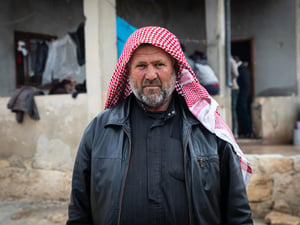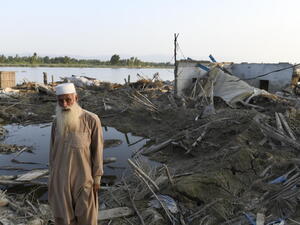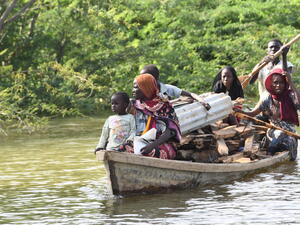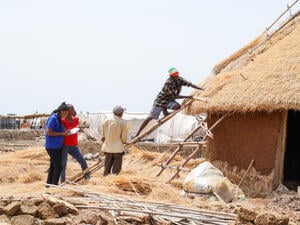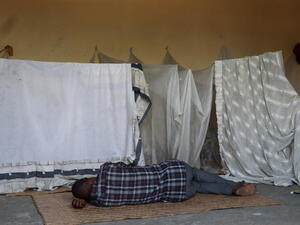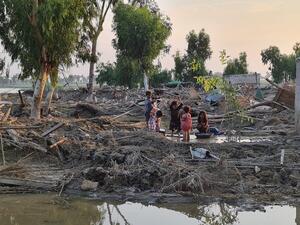Myanmar and Bangladesh: UNHCR rescues, shelters flood victims
Myanmar and Bangladesh: UNHCR rescues, shelters flood victims

Two young children walk away from the ruins of what used to be their home before floods hit their village near Cox's Bazar, Bangladesh.
BUTHIDAUNG, Myanmar, June 17 (UNHCR) - Using speed boats that normally ferry UNHCR staff to remote work sites, the refugee agency has rescued 50 patients from a hospital in western Myanmar from devastating floods, as well as more than 100 children from their inundated homes.
Less than 24 hours after the same torrential monsoon rains hit the Bangladesh side of the border, UNHCR on Wednesday also rushed plastic sheeting to some 4,500 Bangladeshis near Cox's Bazar. Their homes had been destroyed hours earlier by floods and mudslides that killed at least 58.
Eight UNHCR speed boats - routinely used to reach villages on the many rivers flowing into the Bay of Bengal - were used to rescue 104 children and 121 adults trapped by high water in Myanmar's northern Rakhine State.
"The national operators of our boats and their helpers have been enormously brave, especially in rescuing all 50 patients, 20 staff and some important medicine from rapidly rising flood waters in the Buthidaung Hospital," said Dinesh Shrestha, head of UNHCR's field office in Maungdaw. The patients were taken to a school for safety.
In the Maungdaw area, some 270 families were forced to leave their homes and had to seek shelter temporarily in two schools. UNHCR distributed blankets and mosquito nets to 212 of them - emptying its stocks in Maungdaw - and the Myanmar Red Cross Society, private donors and others pitched in with help for the rest.
Even if they could not return to their own homes because of high water, most families went back quickly to stay with relatives in their own hamlets. UNHCR is coordinating the humanitarian response in northern Rakhine State.
Many roads in the state are still under water, and some bridges have been washed away. Three UN refugee agency staff members had to walk nearly four hours to get to work because of mudslides blocking their normal route.
Across the Naf River, which forms the border between Myanmar and Bangladesh, Craig Sanders, UNHCR's representative in Bangladesh, observed that "this is the most devastating natural disaster the people of Cox's Bazar have faced in recent years."
He noted that many of them were already living in poverty, with little or no savings. "This disaster will set them back even further," Sanders said, adding: "We will continue to work with the government and other agencies to ensure that the most vulnerable are able to get back on their feet as soon as possible."
UNHCR helps the Bangladeshi government operate two refugee camps near Cox's Bazar, home to about 28,500 Rohingya refugees from northern Rakhine. According to government estimates, there are also a further 200,000 Rohingya living in the area who are not registered with UNHCR.
"Many of the Bangladeshis who have been affected by this calamity have been generously hosting refugees for the past two decades," Sanders said. "We at UNHCR are glad that we can respond to their needs so quickly and assist them in rebuilding their lives."

